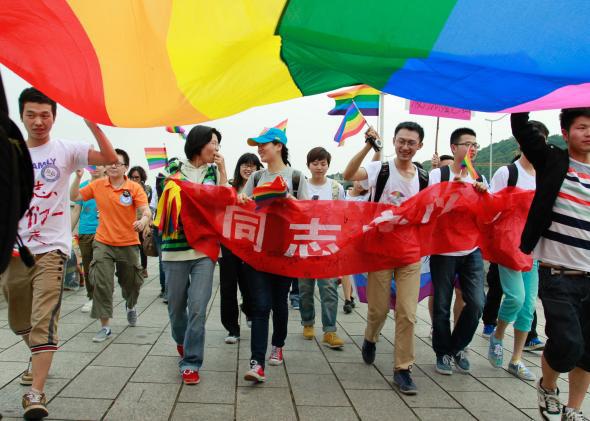In 2009, China banned the use of electroconvulsive therapy as a treatment for Internet addiction. The country’s health ministry concluded that the practice had “no foundation in clinical research” and that there were serious concerns about its safety and effectiveness. While electric shocks can no longer be used in China to keep people off the Internet, however, they can still be used to keep people of the same sex off each other.
That’s the news this week out of Beijing, where a Chinese man who received involuntary electroshock therapy as part of a gay conversion treatment is taking his case to court. The 30-year-old, Xiao Zhen (a pseudonym), is suing both a psychological counseling center for administering the shocks and the Chinese search engine Baidu for advertising the center’s services. Intriguingly, Xiao isn’t just suing under the theory that electroshock therapy is cruel; he’s arguing that homosexuality should not be treated as a disease or a disorder.
In the United States, the scientifically bogus practice of gay conversion therapy is primarily promoted by fundamentalist Christian groups. But in China, an officially atheist country, the motivations behind such “therapy” are more complex. Xiao Tie, an executive director of the Beijing LGBTQ Center told the Wire that most Chinese people who undergo conversion therapy are pressured into it by their families. Traditional family life—in particular, passing on your genes—is highly valued in China, and gays are often seen as broken branches of the family tree. Indeed, the plaintiff in this case sought out treatment for his homosexuality to appease his parents, who are concerned that their son won’t pass on their lineage.
Like many Western countries, China has become increasingly accepting of gay people over the last decade or so, particularly within the larger cities. Shanghai, for example, recently wrapped its sixth ShanghaiPRIDE celebration. Although LGBTQ people are ever more present in everyday life, the conversation around LGBTQ issues remains minimal. As one young Chinese woman who identifies as a lesbian told me, “I don’t feel like most people would want to talk about it.”
But a government hesitant to acknowledge the reality of gay life will now, thanks to Xiao’s lawsuit, be forced to confront it head-on. China officially decriminalized homosexuality in 1997 and declassified it as a mental disorder in 2001. Since then, however, there has been little legal progress on the topic, with the government “not encouraging, not discouraging, and not promoting” any policy. That leaves Chinese LGBTQ people in something of a limbo, with no legal tools to address discriminatory practices in their public lives.
Supporters of Xiao’s lawsuit hope that a ban on gay conversion therapy could break the silence and usher in additional legal protections for LGBTQ people within China. Getting rid of the electrodes certainly seems like a good start.
